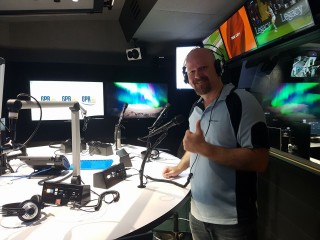Recently I gave a radio interview at local Perth radio station 6PR, about how Gaia Resources has evolved over the years. You can listen to the interview here, or you can listen to it through the embedded player below.
Anyway, what the heck does a radio interview have to do with digital preservation?
Well, I gave the interview at 07:45 on a Sunday morning, and at 08:15 that morning I had an email from the station saying that my content was available online for anyone in the world to listen to. I hadn’t even gotten home from the interview yet, and the audio stream had been digitised, edited and loaded to a web platform and made available! The temporal proximity of that interview to the recent Archives conference of course kicked in (again?) and that got me thinking about how Archives could begin to treat digital archival files in the same sort of way, with the same sort of speed. So, I fired off a few questions to the sole producer (who was also wrangling the show, the phones, guests and keeping an eye on the news for breaking stories) asking how he was able to do this so quickly!
In archival terms, the audio player (and web posts) that I link to above is the “access copy” or “dissemination copy”. It turns out that the speed of the creation of this copy is mainly done through good workflow management, and well designed systems – or rather, services. The hard-working producer has to do very little to create this copy; this one in particular uses a web-based service called Omny which records their stream in chunks of 15 minutes and provides a means to edit the audio stream into clips at any time once it’s recorded. Within as little as five minutes after recording, with very minor manual inervention, you can have the audio player and the simple web post up and live for the world (especially if you’re using a Content Management System, such as WordPress).
But I can already hear the “where’s the archival master?” coming from the Archives community. Well, radio stations in Australia are required by law to keep copies of everything that they broadcast for a period of time (not forever!). So apart from this process to get the access copies out quickly, there are also parallel workflows where other software stores away this digital stream (and this is very much in line with master copies, or “archival copies”). While we didn’t have time to go into heaps of detail about this aspect – let me just say that the station was sitting on a very large internet connection, and they had banks of dedicated hardware running on-site to deal with this sort of thing. The details would be very interesting to delve into, and perhaps looking in more detail, or to talk to groups like the ABC Archives, would also provide insight into how this works, and the ongoing requirements and regulations.
My first time in a radio studio certainly had my head fizzing
This was my first radio experience, and I’m always keen to learn, as well as to see where I can connect the dots. One of the things that I saw here in the station was that there are already well established groups dealing with born-digital files, in extremely high volumes, and they are able to quickly turn around processing for their customers – and they are very, very focused on delivering for these customers. Of course, there’s been a fair bit of investment by the radio station (and parent company, Macquarie Media), in getting this right.
That’s what we’ve been working on with a growing number of archives and collections organisations these days – getting the workflow right around not just digital preservation, but in terms of access copies, staff workload management, skill development, and the like. It’s really important to not just think of the “born digital” tsunami as a technology-only problem – there is a real need to consider the broader picture including resourcing, systems, workflows and skills. So I think it might be time for me to ask if we can set up a site visit to a radio station with our local Australian Society of Archivists chapter, I think!
There’s a lot of devil in the detail here, but it fills me with a sense of excitement that one day, we might just be able to do this with the Archives in Australia as well. If you want to know how we’re already helping some Archives with this, then please get in touch with me directly, or start a conversation with us on Facebook, Twitter or LinkedIn.
Piers


Comments are closed.